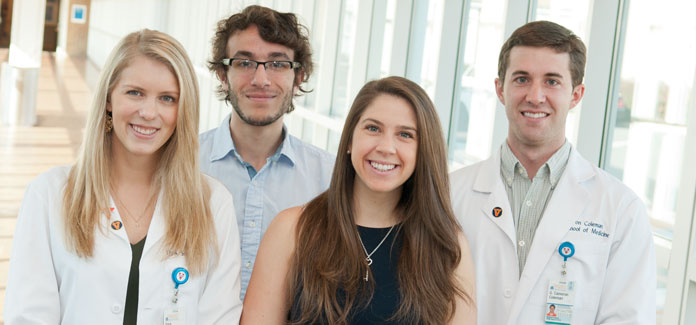A team mixing University of Virginia medical and undergraduate engineering students recently won a national student competition sponsored by the American Medical Informatics Association, the lead professional organization for computers in health care.
Cameron Coleman and Sara James, both second-year students in U.Va.’s School of Medicine, teamed with fourth-year biomedical engineering major Lauren Dobry and fourth-year computer engineering major Kevin McVey on a project related to clinical documentation in the U.Va. Health System’s Neonatal Intensive Care Unit. The team conducted 45 semi-structured interviews with a wide range of documentation users, from attending physicians to billing staff to malpractice lawyers. They recorded, transcribed and coded the interviews using qualitative research methods to develop themes, which formed the basis of user requirements for electronic clinical documentation.
The work was funded by the School of Medicine and a Children’s Hospital grant. The team’s faculty adviser, Dr. Stephen Borowitz of the Department of Pediatrics, provided supplemental funding from his David C. Harrison Distinguished Educator Award. The principal investigator was Dr. Lacey Colligan, formerly a neonatology fellow at U.Va.
Based on the user requirements, the team proposed an innovative, yet technically feasible, redesign of NICU progress notes. Important features included cognitive support for information-seeking and visual icons that support instant recognition of patient complexity. The students presented their submission, “The In-patient Progress Note: Less is More,” to more than 200 clinical and informatics professionals at the American Medical Informatics Association’s national conference, held in November in Washington, after which they fielded questions from the judges and audience members.
“I sat in the audience and thought, ‘Wow, they really understand the clinical process,’” said neonatologist Dr. William Drummond of the University of Florida, one of the attendees.
Marcela McClary, a sponsor of the competition, also was impressed. “I couldn’t believe this was a team of medical students and undergraduates,” she said.
Colligan added, “This team’s work exemplifies the best of U.Va. – true multi-disciplinary collaboration where we learned from each other, mastered difficult concepts and grew both personally and professionally. We also had a lot of fun.”
The team won first place for the work, beating Ph.D. student teams from Harvard University and the Massachusetts Institute of Technology, who took second and third place, respectively.
Media Contact
Article Information
January 3, 2014
/content/uva-engineering-medical-students-team-win-national-competition

